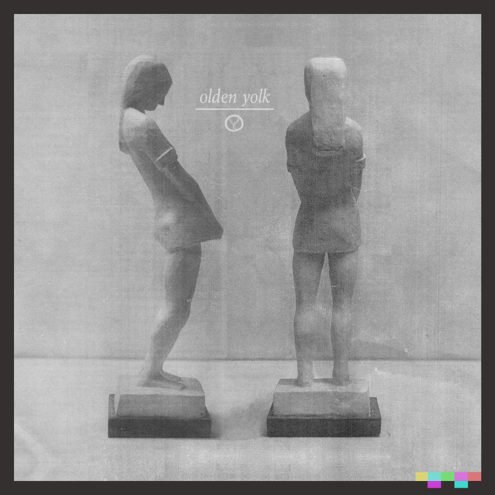“Olden Yolk” by Olden Yolk


The moniker “Olden Yolk” sounds like the name of some experimental British folk band of quiet, shaggy intellectuals from the ‘70s. In fact, they got their start as the brainchild of Quilt’s Shane Butler, which eventually germinated into an artistic partnership with Caity Shaffer with a backing band containing members of both Quilt and Mutual Benefit. And as you might imagine, the band’s soft-spoken psych-folk and ruminative, self-defeating/contradicting lyrics live up to the obtuse name.
It could be taken both as mild criticism and praise bordering on preciousness to say that Olden Yolk’s self-titled debut for Trouble in Mind would fit well as a soundtrack for a Wes Anderson film, particularly one of his newer ones that feature those befuddled stop-motion-animation animals. How better can you say, though, that it’d be an understatement to observe that the album sounds nostalgic, to the point of utterly out of this time? For the first few songs, at least, it’s all so cozy and down-tempo, so deliberately reminiscent of tried-and-true folk-rockers of the late ‘60s and mid ‘70s that it borders on being a little too safe. The enveloping guitar tone washes of the opener “Verdant,” and the brisk, krautrock-influenced pulse of “Cut to the Quick” are equal parts calming and infectious, but perhaps lack muscle—not unlike Butler and Shaffer’s coolly-delivered lyrical lines that seem to double back on their arguments as soon as they’re made. Nonetheless, they get some good ones off–funny little snapshots of the compromised spaces their protagonists inhabit: “When they wake you nearly dirt/With Don Quixote in the common room”… “Like any place just the same/A prayer, a bottle, a wandering sensation/…Of leaving.”
Song by song, those lyrics that zig-zag through layers of abstracted meaning lead us through a vision of urban dwellers cycling through relationships, friendships, personal struggles and homes. Harder-rocking moments like those in “Espirit De Corps” and the more lyrically-direct “It Takes One to Know One” inject some fire into the album’s slightly repetitive, lulling flow to awesome effect. Textural details like the mysterious transmissions at the beginning of “After Us,” as well as the driving rain that creeps in towards the middle of the track, show Olden Yolk’s attentiveness to experimental-leaning sound, though it all just ties in with the straightforward pulse of the music. It’s an album that seems as reluctant to give up its secrets as it is eager to please, and that’s not a bad thing.




